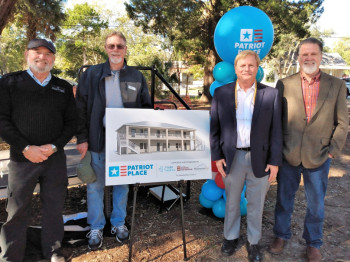Trending Multifamily News
Entrata, the multifamily industry’s most comprehensive technology platform, today announced the company has raised $507 million, led by Silver Lake, Qualtrics Founder Ryan Smith and Vivint Smart Home Founder Todd Pedersen, with participation from Dragoneer, Domo Founder and CEO Josh James, and other strategic investors. In addition, Pedersen and Silver Lake Managing Director Kyle Paster will join the company’s board of directors.
Over the course of the last two decades, Entrata has become a category leader and the only comprehensive property management software provider with a single-login, open-access platform. Currently processing more than $20 billion in rent payments annually through its platform, Entrata serves more than 20,000 apartment communities across the United States. Additionally, it is the fastest-growing software company in real estate with over $200 million in annual recurring revenue and more than 2,100 employees with plans to add hundreds more in 2021 alone.
“It’s incredibly rare to see a business or its leadership have the foresight to create a company that can grow so rapidly at scale across an entire industry. Entrata’s platform directly meets the needs of property managers because of its flexibility and intuitive nature,” said Silver Lake Co-CEO Egon Durban and Managing Director Kyle Paster. “This company is perfectly positioned to continue scaling quickly, and the potential within the industry is massive. We’ll see them become a true household name in the tech industry quickly as they continue to take share as a cloud market leader.”
Representing the largest private investment round in Utah history, the infusion of new capital will allow Entrata to more than double its research and development spend in the Entrata platform in the coming years and to adopt an aggressive go-to-market strategy including international expansion planned in the near future. With plans to heavily invest in personnel and improve efficiencies in the client experience, the new funding will fuel the company’s next stage of innovation.
“It’s rare to find a company of this size and scale that has not taken institutional funding. Bootstrapping forces a company to build with the long-term view in mind which leads to better experiences for customers and employees,” said Smith. “I’ve always believed in the ‘nail it, then scale it’ model and this new capital will help Entrata accelerate and scale in a way that positions them to become the unquestioned leader in global property management throughout the world.”
As the first institutional round of capital raised by Entrata since its founding in 2003, the investment will represent a minority ownership in the company, with founder and chairman Dave Bateman retaining majority ownership. Adam Edmunds has also joined Entrata as CEO to provide the vision and drive through the company’s next phase of growth. Edmunds has founded, grown and exited several SaaS companies, including Allegiance, which sold to MaritzCX in 2014. He was most recently president of the communications and payments platform Podium. Industry veteran Chase Harrington, president and COO of Entrata, will partner closely with Edmunds to set company strategy, establish product roadmap, and promote industry best practices.
“We've spent nearly two decades profitably bootstrapping Entrata into the clear technology, innovation and client service leader it is today, with a product that all of our competitors are chasing,” said Bateman. “With this strategic funding and Adam leading the team and company into its next phase, we are well positioned to aggressively expand our market share and continue to deliver the unrivaled experience our clients and their residents have come to expect from Entrata.”
“We couldn’t be more excited to partner with world class investors Silver Lake and Dragoneer, who bring unmatched expertise as we enter this new phase in Entrata’s journey. Additionally, partnering with trailblazing local leaders like Ryan Smith, Todd Pedersen and Josh James will give the executive team experienced allies with skills specific to our location,” said Edmunds. “I’ve never seen a market opportunity and competitive landscape quite like this. We have the strongest product in the industry, the best team, and now capital to execute at an even faster pace than before. Entrata will continue to lead through its innovation and unmatched client experience.”
For more information about Entrata and its technology, please visit www.entrata.com.
ABOUT ENTRATA
Founded in 2003, Entrata® is the only comprehensive property management software provider with a single-login, open-access platform. Offering a wide variety of online tools including websites, mobile apps, payments, lease signing, accounting, and resident management, the Entrata® platform currently serves more than 20,000 apartment communities nationwide. Entrata’s open API and superior selection of third-party integrations offer management companies the freedom to choose the technology and software that best fit their needs. For more information, go to www.entrata.com.
Media Contact:
LinnellTaylor Marketing
Stephen Ursery
303-682-3945
This email address is being protected from spambots. You need JavaScript enabled to view it.
The National Multifamily Housing Council (NMHC)’s Rent Payment Tracker found 79.3 percent of apartment households made a full or partial rent payment by August 6 in its survey of 11.4 million units of professionally managed apartment units across the country.
This is a 1.9-percentage point, or 223,000-household decrease from the share who paid rent through August 6, 2019 and compares to 77.4 percent that had paid by July 6, 2020. These data encompass a wide variety of market-rate rental properties across the United States, which can vary by size, type and average rental price.
“Over the past few months apartment residents have largely been able to meet their housing obligations. In no small part, this is due to the enhanced unemployment benefits enacted under the CARES Act and significant steps by apartment owners and operators to help their residents. These unemployment benefits that have proven so important to so many households have now lapsed, meaning greater financial distress for millions and the potential worsening of America’s housing affordability crisis,” said David Schwartz, NMHC Chair, and CEO and Chairman of Chicago-based Waterton.
“While President Trump announced executive orders relating to rental assistance and continued unemployment benefits, it is unclear when and if those resources will be available to families. NMHC continues to urge the Trump administration and Congressional leaders to restart negotiations and reach a comprehensive agreement on the next COVID relief package. It is critical lawmakers take urgent action to support and protect apartment residents and property owners through an extension of the benefits as well as targeted rental assistance. That support, not a broad-based eviction moratorium, will keep families safely and securely housed as the nation continues to recover from the pandemic.”
The NMHC Rent Payment Tracker metric provides insight into changes in resident rent payment behavior over the course of each month, and, as the dataset ages, between months. While the tracker is intended to serve as an indicator of resident financial challenges, it is also intended to track the recovery as well, including the effectiveness of government stimulus and subsidies.
However, noteworthy technical issues may make historical comparisons imprecise. For example, factors such as varying days of the week on which data are collected; individual companies’ differing payment collection policies; shelter-in-place orders’ effects on residents’ ability to deliver payments in person or by mail; the closure of leasing offices, which may delay operators’ payment processing; and other factors can affect how and when rent data is processed and recorded.
NMHC is proud to partner with the following firms on this initiative:
|
Payment level represents a payment rate of 98.1 percent compared to May 1-6, 2019 |
|
The NMHC Rent Payment Tracker is powered by Entrata, MRI Software, RealPage, ResMan and Yardi |
|
The National Multifamily Housing Council (NMHC)’s Rent Payment Tracker found 80.2 percent of apartment households made a full or partial rent payment by May 6 in its survey of 11.4 million units of professionally managed apartment units across the country.
This is a 1.5-percentage point decrease in the share who paid rent through May 6, 2019 and
“Despite the fact that over twenty million people lost their jobs in April, for the second month in a row, we are seeing evidence that apartment renters who can pay rent are stepping up and doing so,” said Doug Bibby, NMHC President. “We expect May to largely mirror April, when the payment rate increased throughout the month as financial assistance worked its way to people’s bank accounts.”
“However, we are in uncharted waters and will be watching this closely over the course of the month as millions of households will not be able to access unemployment benefits, and those who have may find that they are not enough to cover rent plus all the other financial pressures caused by this crisis,” said Bibby. “Those benefits will also likely fall short in high-cost areas. That’s why we are calling on Congress to include $100 billion in direct renter assistance in the next pandemic relief package.”
“When millions of renters found themselves sheltering in place at their apartment home, apartment firms made it a priority to help them retain their housing,” said David Schwartz, NMHC Chair, and CEO and Chairman of Chicago-based Waterton. “NMHC called on apartment firms to halt evictions for residents impacted by COVID-19, waive late fees and create payment plans for them and also avoid rent increases for 90 days to help residents weather the crisis. Many took up that call, and others went even further to help their residents. However, we can’t do it alone. We need Congress to help.”
“The cascading effect of any rent gap is meaningful,” said Bibby. “Apartment owners have $1.6 trillion in outstanding mortgage debt. If they can’t cover their debt, we might see a wave of multifamily foreclosures that could rival the single-family foreclosures that occurred during the Great Recession. In addition, apartment owners pay $58 billion in property taxes that help support essential services such as schools, emergency services and other important local needs.”
This survey is one of a number of NMHC-produced resources focused on the COVID-19 outbreak.
Additional resources, data and materials can be found here. |












